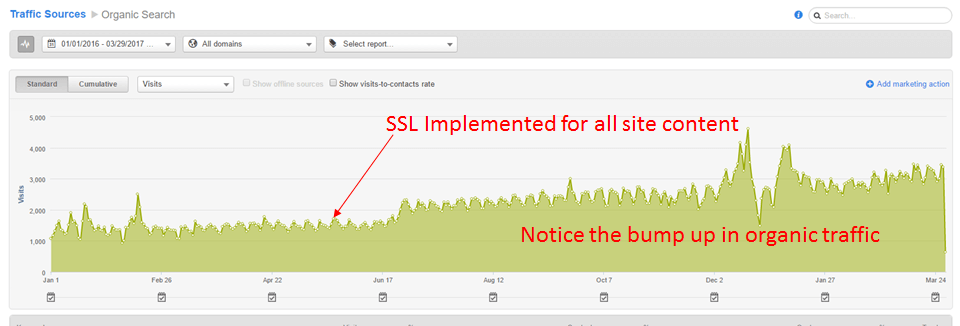Upgrade To SSL/HTTPS Secure Website for SEO
Let’s start with some basic definitions.
SSL stands for Secure Socket Layer. SSL.com defines it further as:
“the standard security technology for establishing an encrypted link between a web server and a browser. This link ensures that all data passed between the web server and browsers remain private and integral…To be able to create an SSL connection a web server requires an SSL Certificate.”
SSL certificates can be obtained from trusted authorities. Once you obtain an SSL certificate the URL for your website will be altered to easily identify that your connection is secure.
So, instead of an HTTP (Hypertext Transfer Protocol) address you will have an HTTPS (Hypertext Transfer Protocol Secure) address.
You’ve probably noticed that some websites you visit will have a lock icon in the address bar and https:// before their address. This denotes the use of an SSL certificate.
Websites that are encrypted with an SSL certificate are more secure than those that are not. This is especially important if your website collects information (bank details, email address, etc.) from visitors.
Why You Should Care About SSL
Aside from the obvious security advantages of SSL, you might be asking yourself why, as a marketer, you should care about SSL. Perhaps the most compelling reason to invest in SSL, from a marketing standpoint, is that Google uses HTTPS as a ranking signal.
Googles Webmaster Central Blog addressed the implications of HTTPS on SEO back in 2014. Google Webmaster Trends Analysts Zineb Ait Bahajji and Gary Illyes said:
“We’ve been running tests taking into account whether sites use secure, encrypted connections as a signal in our search ranking algorithms. We’ve seen positive results, so we’re starting to use HTTPS as a ranking signal…we’d like to encourage all website owners to switch from HTTP to HTTPS to keep everyone safe on the web.”
So, from an SEO standpoint, SSL should probably be on your radar. Personally, I’ve already seen the impact of SSL on SEO as our clients have begun making the switch to HTTPS.
Organic Traffic Boost
Midway through May 2016, for example, one of our clients, Bell Performance, made the switch to HTTPS.
Bell Performance operates a robust Shopify e-commerce site and regularly processes customers information when taking orders.
Wanting to keep their customers’ information safe, they made the switch to HTTPS for security reasons. However, not long after adopting SSL we began to notice an increase in organic traffic.
Of course, many things can impact organic traffic, but the switch to HTTPS is the only significant change Bell had made during that time period. And, as you can see, the surge in organic traffic was impressive.
Moving forward, as Google weights HTTPS more heavily I suspect that this type of traffic increase will become more common for companies that make the switch. Certainly, a big boost to organic traffic will serve as an enticement for any company that hasn’t adopted SSL already.
If You Haven’t Made the Switch, Now Might Be the Time to Upgrade to HTTPS
Upgrading to HTTPS isn’t terribly difficult. Depending on where your website is hosted an HTTPS upgrade might even be included. HubSpot customers, for instance, who use the Website Platform can get a standard SSL certificate for free. Shopify is another common hosting service that make the switch to HTTPS simple.
Things to Consider
If you aren’t already using a service that includes HTTPS, however, securing your site is still pretty straightforward.
The most important things you’ll need to consider are how many certificates you’ll need and the domains you want to secure. You will also have to decide how long you want your certification to be valid for.
Typically, SSL certificates are valid for one to two years but longer periods are also available.
You can purchase an SSL certificate from authorities like GoDaddy, GeoTrust, Globalsign, or Network Solutions.
The service you choose to use for your certification should provide information on how to install it and update your site.
Next Steps
Fortunately, most hosting companies will set up an SSL for you, so I recommend calling up your technical support and letting them handle the transition to HTTPS.
As always, ask technical support how long the transition will take to propagate, then get through the website looking for any technical issues like broken pages, broken links, or broken images.

